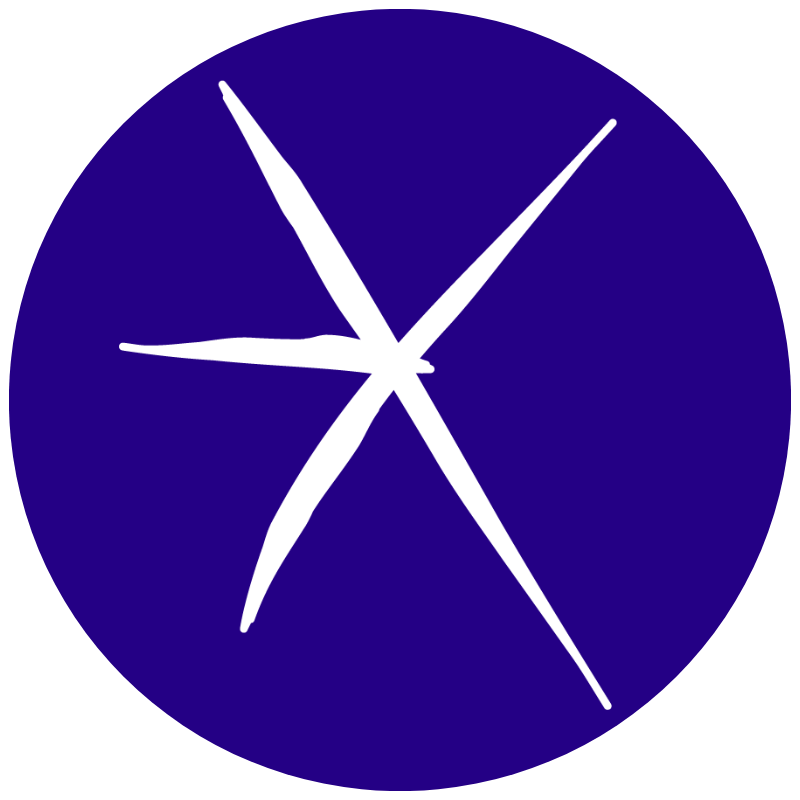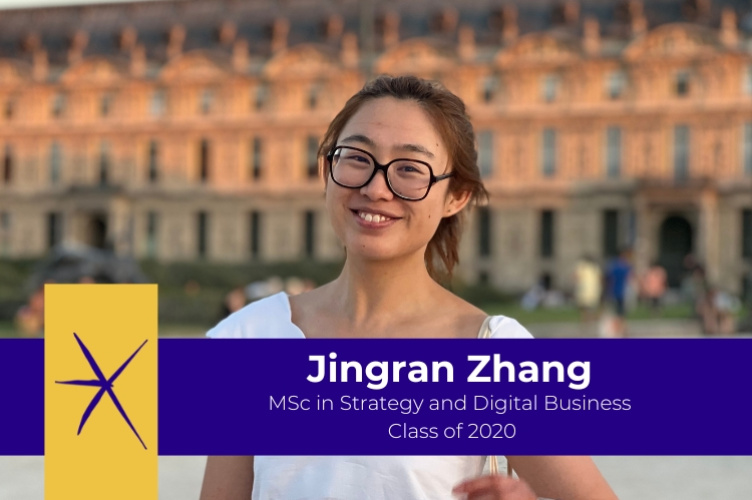Master in Strategy and Digital Business (MSc)
Meet our alumni: Jingran Zhang, Class of 2020
 Jingran Zhang’s journey from linguistics to fintech illustrates the transformative power of a strategic specialised master’s degree, cross-disciplinary ambition, and curiosity. After her bachelor degree in French, she launched an e-commerce venture in China, and then joined the Master in Strategy and Digital Business to formalise her business knowledge and pivot into tech. Five years later, she’s a product manager in enterprise tokenization at a Berlin-based fintech firm, applying the strategic, technical, and cross-cultural skills gained during her studies.
Jingran Zhang’s journey from linguistics to fintech illustrates the transformative power of a strategic specialised master’s degree, cross-disciplinary ambition, and curiosity. After her bachelor degree in French, she launched an e-commerce venture in China, and then joined the Master in Strategy and Digital Business to formalise her business knowledge and pivot into tech. Five years later, she’s a product manager in enterprise tokenization at a Berlin-based fintech firm, applying the strategic, technical, and cross-cultural skills gained during her studies.
Tell us about yourself.
I’m Jingran, and I'm originally from China. I completed my Bachelor's in French Language and Literature at Southwest Jiaotong University, which included an exchange year at Université Lyon 2 in France. This foundation in languages and cross-cultural communication naturally led me to work as a commercial interpreter for Air France in Beijing.
It was during this time that I discovered an entrepreneurial passion. Witnessing China's explosive e-commerce growth driven by Alibaba and JD.com, I founded an online store specializing in French beauty products for Chinese consumers. What started as a side project grew into a business that I managed for 2.5 years, building a WeChat community of over 400 customers and handling everything from product testing and v-logs to order fulfillment and marketing campaigns.
This experience was transformative - it showed me the excitement of building something from scratch while navigating cross-cultural business challenges. I realized I wanted to deepen my understanding of business strategy and digital innovation, which ultimately led me to pursue this master's degree. The combination of my linguistic background, international perspective, and hands-on entrepreneurial experience made me eager to learn the theoretical frameworks behind successful business management.
Walk us through your thought processes when you decided to apply to the MSDB and what you felt this type of programme could add to your profile.
After running my e-commerce business for over two years, I realized that while I had developed strong practical skills in entrepreneurship, I lacked the strategic frameworks and analytical tools to scale effectively. I was making decisions based on intuition rather than data-driven insights, and I wanted to bridge that gap between hands-on experience and business acumen.
What immediately attracted me to the MSDB programme was its comprehensive curriculum that spanned finance, international marketing, strategy, entrepreneurship, and even coding. Coming from a linguistics background, these were entirely new areas for me, and I was genuinely excited by the prospect of exploring them. I saw each subject as a piece of a larger puzzle - finance would help me understand the numbers behind business decisions, marketing would refine my customer acquisition strategies, and coding would give me the technical literacy increasingly essential in today's digital landscape.
The programme's strategic focus particularly appealed to me because I wanted to move beyond just "doing business" to truly understanding how successful companies think strategically about growth, market positioning, and digital transformation. I believed this holistic approach would give me clarity on which direction to pursue professionally - whether that was continuing as an entrepreneur, joining a startup, or working in product management for an established company.
Looking back, the programme delivered exactly what I hoped for. It provided me with the analytical frameworks and strategic thinking that now guide my work as a Product Manager in the fintech space, where I apply everything from data analysis to user experience design on a daily basis.
What has your career path looked like since graduating from ESCP? What are you up to now?
My career journey since ESCP has been quite dynamic. Right after graduation, I joined a Paris-based startup building supply chain visibility software. This was my first deep dive into product management in a fast-growing tech environment, where I worked closely with a team of 10 engineers to manage product backlogs and lead Agile development processes. What I found most interesting was using quantitative tools like Google Analytics to analyze user behavior, combined with qualitative research through user interviews - it was the perfect blend of data-driven decision making and human-centered design that ESCP had taught me to value.
After gaining solid product management fundamentals, I was drawn to Berlin's emerging blockchain ecosystem. The technology was still nascent, mainly popular among retail customers, but I saw tremendous potential in the B2B space. I joined a crypto custody startup that was just beginning to explore tokenization - a completely new frontier at the time. What excited me most was the opportunity to build products from the ground up in an entirely uncharted territory.
Today, I'm a Product Manager leading the development of enterprise tokenization infrastructure at a Berlin-based fintech company. I define comprehensive product roadmaps, work directly with German banking clients on compliance requirements like anti-money laundering, and manage end-to-end tokenization projects while navigating complex regulatory frameworks.
What do you enjoy about working as a product manager/in the financial services space?
What I love most about product management in financial services is the unique combination of strategic thinking, technical complexity, and real-world impact. Every day, I'm essentially solving puzzles - whether it's designing user onboarding flows that simplify complex tokenization processes for enterprise clients, or figuring out how to build features that meet both user needs and stringent regulatory requirements like MiCA compliance.
What energizes me is the strategic aspect of product management - conducting competitive research to identify new opportunities, then defining product roadmap that turn those insights into concrete features. I also love the collaborative nature of the role, working directly with regulatory bodies, designers, engineers, and clients to ensure every product decision balances innovation with usability, security and compliance.
What aspect/experience of the curriculum did you enjoy the most? Is there anything specific that has served you well in your career so far?
The strategic planning and entrepreneurship courses were absolutely transformative for my career. What I loved most about the strategic planning curriculum was learning how to deconstruct complex business challenges into manageable, analyzable components using structured frameworks. This systematic approach has become invaluable in my current role - when I'm defining product roadmaps or navigating technical complexities and regulatory requirements, I instinctively break down these multifaceted problems into smaller, actionable pieces that my engineering teams can execute effectively.
The entrepreneurship courses were equally impactful, not just for the theoretical knowledge but for the network and mindset they fostered. I connected with several founders during the program, and maintaining those relationships has given me ongoing insights into the startup ecosystem. Watching their journeys - the pivots, the regulatory hurdles, the funding challenges - has taught me that ambiguity and setbacks are simply part of building something innovative. This perspective gives me resilience when working in the rapidly evolving crypto space, where regulatory frameworks are constantly shifting and technical challenges emerge daily.
How important for you was studying in Berlin and in Paris? What was the experience like?
Studying in both Berlin and Paris was absolutely crucial to my development, both personally and professionally.
Paris introduced me to a more traditional, structured approach to business strategy and corporate culture. Berlin, on the other hand, exposed me to a more experimental, startup-driven environment. The contrast was fascinating - I could see how the same business principles played out differently across these two major European markets.
Yes, the logistics were challenging - moving between cities, adapting to different academic systems, and managing the practical aspects of living in two countries. But the cross-cultural experience and diversity of perspectives outweighed these inconveniences. Being immersed in both French and German business cultures taught me to adapt my communication style and strategic thinking to different contexts - a skill that's proven so invaluable in my current role working with German banking clients while managing international stakeholders.
Did you intend to stay and build a career in Europe? Do you feel your degree helped?
To be honest, building a long-term career in Europe wasn't initially my goal when I started the program. However, I found myself increasingly drawn to Europe's unique startup ecosystem and its distinctive balance of innovation with strong regulatory frameworks - something that's become especially important in the fintech space where I now work. What started as an educational journey gradually evolved into a career path as I discovered opportunities that aligned with my interests and skills.
The ESCP degree was instrumental in making this unexpected transition possible. Beyond just the academic credentials, having a degree from a renowned European business school opened doors that might have otherwise remained closed to someone transitioning from a linguistics background into product management.
To what kind of specific person would you recommend the MSDB?
I'd highly recommend the MSDB to anyone who's curious about exploring business areas completely different from their undergraduate major. If you're like me - coming from a non-business background like linguistics, sciences, or engineering - but feel drawn to understanding how businesses actually work strategically, this programme is great. It's designed for people who want to make a career pivot but need comprehensive business foundations to do so successfully.
My key tips for incoming students: First, stay deeply connected with the ESCP alumni community - this network has been tremendously helpful in guiding my career development. Alumni have provided everything from industry insights to job referrals, and many have become long-term mentors.
Second, embrace the logistical challenges of the dual-city format. Yes, it's complicated, but use it as an opportunity to build adaptability and cross-cultural competence that will serve you throughout your career.
Finally, approach the curriculum with genuine curiosity rather than just checking boxes. Each course - whether it's finance, coding, or strategy - might seem disconnected at first, but they’re interconnected in ways you may appreciate later in your career.
Campuses
